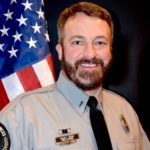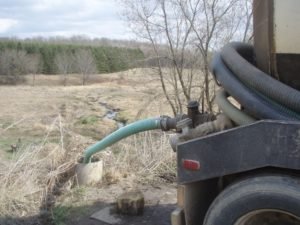An article from WWA’s Words From The Wardens.
This article originally appeared in Wisconsin Waterfowl Association’s May, 2021 eNewsletter.
By Capt. Shaun Deeney, Investigations & Environmental Enforcement; shaun.deeney@wisconsin.gov
As summer fast approaches, I bet I am like you in being anxious to enjoy Wisconsin’s warm weather recreation fun. That involves anything outdoors – and usually includes water. Wetlands are critical landscape features that provide many benefits, including flood storage capacity, purifying surface water and drinking water, habitat for fish and wildlife and more.
Having spent many early mornings in a duck blind, I likely share the same understanding as many Wisconsin Waterfowl Association members – that wetland protection is an integral part of wildlife conservation. This is why I became a conservation warden, and why I am incredibly proud to lead our environmental enforcement (EE) team.
I wanted to take this opportunity to speak to the WWA about what we do. Chances are you may not know about this specialized section of the Division of Public Safety and Resource Protection – formerly known as the Bureau of Law Enforcement.
OUR SECTION AND ENFORCEMENT PHILOSOPHY: STEPS!
Our newly organized investigative section merged with ten environmental enforcement specialists located throughout the state. These staff work alongside conservation wardens, investigators and other DNR regulatory programs to prioritize and process enforcement cases for the most egregious and intentional environmental violations. We believe in due process and excellent customer service. Being fair and consistent in how we enforce the law is a must.
Our program follows a “stepped” enforcement process for a variety of regulatory violations, including wetland laws and regulations. The more complex cases are those where someone has altered a stream channel, filled a wetland or otherwise caused significant damage to areas that will take a long time to restore or mitigate the damage. Cases come from various places, including the DNR’s violation hotline, the DNR’s regulatory programs, and sometimes other agencies. When a violation requires follow up, we send out what is referred to as a Notice of Violation, or NOV, to the alleged violator. This notice provides a basis for the allegation and offers an opportunity for the responsible person(s) to attend a voluntary meeting to explain the circumstances.
Our EE specialists then make recommendations for what to do next after the enforcement conference. Often there is a misunderstanding of the regulations and the problem can be resolved at the local level without any enforcement action. Some cases can be handled with a citation – and not often, but sometimes – a referral to the Wisconsin Department of Justice for when civil penalties or injunctive relief is necessary.
CURRENT CHALLENGES
With respect to wetland protection, our enforcement program assists in investigating the circumstances behind alleged violations of agricultural manure spills, non-compliance at concentrated animal feeding operations (CAFO), septage or storm water runoff and wetland fills. Sometimes we will get questions about how we decide which of those cases to pursue and enforce. With cases involving intentional violations, significant environmental harm, or when the violator shows a pattern of illegal activity, we will prioritize those over unintentional or unavoidable situations.
It is important to remember that in order to keep an even playing field, we have to consistently enforce the regulations across the state. Permittees who take the time to hire a consultant, evaluate the wetland impacts and obtain the correct permits expect us to hold the unpermitted violators to task. Regulatory challenges become trickier when there are multiple programs, agencies or jurisdictions involved.
As EE specialists, we do our best to handle all reported regulatory violations statewide. However, Wisconsin citizens play a critical role in keeping Wisconsin’s waterways clean. That is why we prioritize education and community involvement across the state.
Making new partnerships with groups such as WWA is essential to me. If you are interested in learning more about some of the enforcement challenges we face in our program, please send me an email, I’d love to hear from you! We likely share the same goals for protecting wetlands.
VIOLATOR HOTLINE
Ask any warden and you’ll hear some of the best cases come from citizen tips. We can’t be everywhere, so we truly value the partnership we have with our citizens who share our passion for our state’s incredible resources.
If you have a tip regarding an environmental, recreation or wildlife violation, you can confidentially report it by calling or texting: 1-800-TIP-WDNR or 1-800 847-9367. Dispatchers will take your information and relay it to a warden. You also may file information online: dnrx.wisconsin.gov/rav/
I appreciate your time today, and please don’t hesitate to contact us with questions or tips. Enjoy your warm-weather fun and stay safe!


